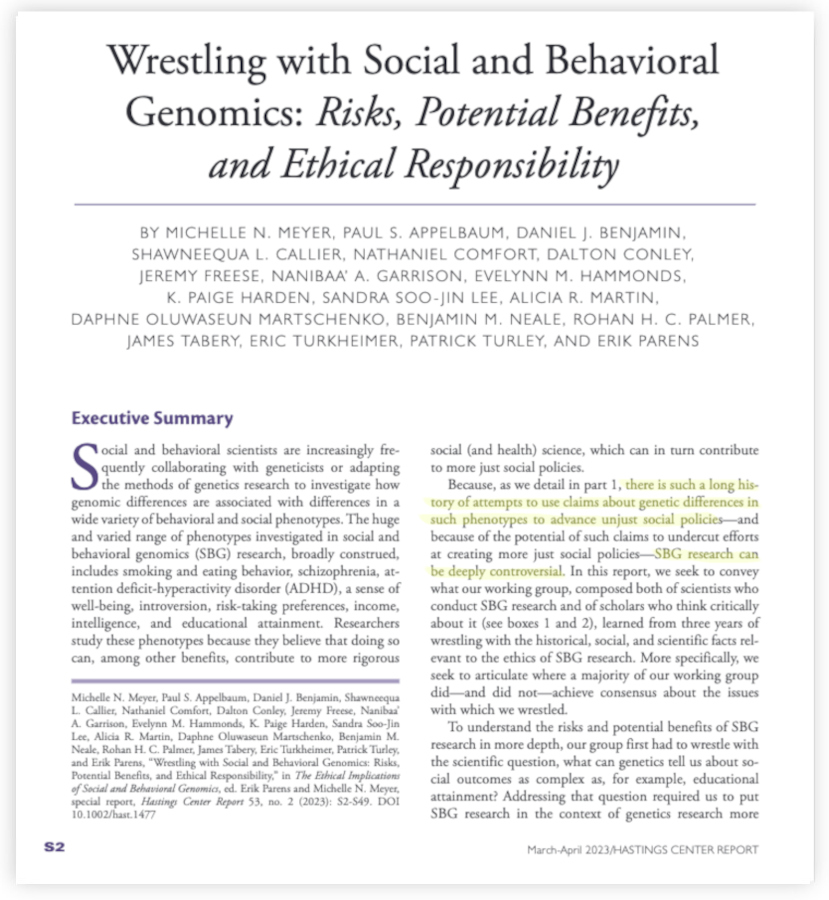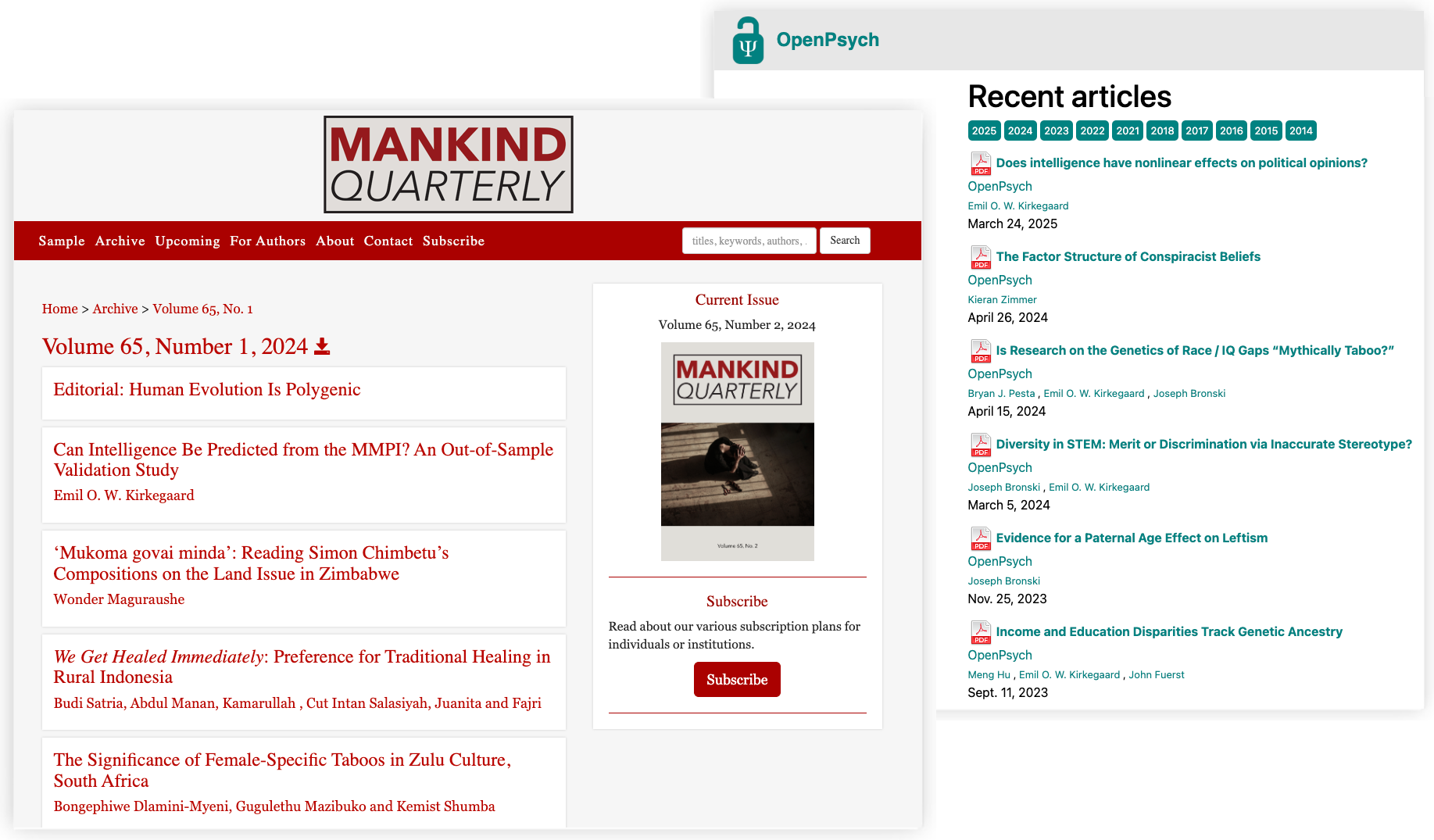In the summer of 2022, Abdel Abdellaoui was set to give a keynote at the annual conference of the International Society for Intelligence Research. But when he learned he’d be sharing a speaker roster with Emil Kirkegaard, Abdellaoui announced on Twitter that he was cancelling his lecture.
Kirkegaard is perhaps best known for his provocative writing on genetics and race. On his blog, he has asserted that Black Americans are less honest and less intelligent than their White counterparts; that affirmative action produces Black and Hispanic doctors who kill people with their incompetence; that Africans are excessively predisposed to violence; and that the hereditarian hypothesis of intelligence — roughly, the idea that races or ancestry groups differ in average intelligence in ways that are substantially attributable to genetics — is “almost certainly true.”
At the time of the 2022 conference, “this guy was having a bad influence with the crap he was spreading, and the way he behaved online, and he was giving our scientific field a bad name,” recalled Abdellaoui, a geneticist working in the Department of Psychiatry at Amsterdam University Medical Center whose research interests include the genetics of intelligence. Abdellaoui noted in a post on Medium that Kirkegaard had never been part of any credible research program or Ph.D. program, and had a reputation for publishing sloppy scientific work in dubious journals. “I just didn’t want to be associated with that, and I wanted to have that be clear — that he’s not on my team and I’m not on his.” (Kirkegaard did not respond to multiple email requests for an interview for this story.)
Shortly after Abdellaoui announced his withdrawal, he learned that Kirkegaard was scratched from the speaker lineup, and Abdellaoui decided to give the keynote after all. Yet just two years later, Kirkegaard would be back at the ISIR conference podium — a podium that has served as a platform for Kirkegaard and other proponents of the hereditarian hypothesis since long before Abdellaoui’s threatened boycott. Their presence at ISIR, alongside psychologists and geneticists from many of the world’s top research institutions, underscores a complicated reality in this fraught field of study: When it comes to the genetics of intelligence, the line between mainstream and fringe can be hard to pin down, and the work of the former can intertwine with that of the latter in ways that are difficult to disentangle.
Abdellaoui is one of many scientists who have used genome-wide association studies, or GWAS, to identify genetic variants associated with intelligence and educational outcomes. He is interested in this work, in part, as a window into understanding conditions such as autism and bipolar disorder; others explore genetics and intelligence to improve education and hone experimental methods in the social sciences. But data from the GWAS that Abdellaoui and his colleagues conduct are frequently redeployed in service of testing the hereditarian hypothesis. A culture of open science has kept this spigot of data flowing with few restrictions.
Genetics researchers are, by and large, dubious of efforts to demonstrate a genetic basis for racial or ancestral-group differences in intelligence. The current tools of genetics, they say, simply aren’t equipped to explain which, if any, portions of observed group differences in complex human traits are attributable to the effects of genes, rather than environmental, cultural, or social factors.
Should scientists working on topics with far-reaching social implications have to show that the benefits of their work justify the societal risks?
But there’s no guarantee that this state of affairs will hold forever, or so concluded a working group of experts convened by The Hastings Center, a bioethics-focused nonprofit, to grapple with pressing issues in social and behavioral genomics: It is possible, the authors warned in 2023, that efforts to discern group differences in genetic propensities for traits like intelligence could one day gain scientific legitimacy. Although they disagreed on the likelihood of that scenario, they agreed that the social costs, were it to come to pass, could be vast — all the more so if findings happened to align with existing stereotypes against minoritized groups.
That’s left Abdellaoui and other genomics researchers with a dilemma: As they improve their ability to account for the nongenetic factors that muddle, or confound, genetic signals in GWAS, they could be helping to fuel a line of inquiry that could have troubling consequences. “I can imagine that someone like this Kirkegaard guy, if he was able to do this in a methodologically sound way — which is a big ask, because there are so many confounders that are hard to deal with — that he would grab that chance,” he said.

Geneticist Abdel Abdellaoui is one of many scientists who have used genome-wide association studies to identify genetic variants associated with intelligence and educational outcomes.
Visual: Courtesy of Abdel Abdellaoui
Already, Kirkegaard and others in his circle have sought to weave the tenuous, contested body of work on the hereditarian hypothesis into policy arguments against diversity in hiring and education. And — months into a Trump administration that has pledged to purge diversity, equity, and inclusion from the federal government, threatened to defund colleges that have diversity-related programming, and blamed a deadly plane and helicopter collision on diversity hiring — there are signs those views are ascendant in American society.
For Abdellaoui, the possibility that his own work could, indirectly, advance the cause of the Kirkegaards of the world is a cost of doing business that he’s decided he can live with. For the broader genomics community, the prospect that today’s research advances could conceivably open a door to tomorrow’s legitimate studies of genetic ancestry and intelligence raises a question with no clear answer: Should scientists working on topics with far-reaching social implications have to show that the benefits of their work justify the societal risks? Or is the valid, scientific pursuit of knowledge justification enough? And either way, should scientists curb their own research if they know that others may abuse it?
According to archived conference programs, the International Society for Intelligence Research’s inaugural meeting, held 25 years ago in Cleveland, Ohio, featured a presentation by University of California, Berkeley, psychologist Arthur Jensen called “Racial g Factor Differences and Mental Growth Trajectories.” In it, Jensen argued that Black children systematically lack the intelligence of their White counterparts. The same year, University of Western Ontario psychologist J. Philippe Rushton, who became infamous for his prolific and widely discredited race science research, presented a talk on “South African Black-White IQ Differences.” (Psychologists Joseph Fagan and Cynthia Holland, meanwhile, presented evidence suggesting that racial IQ differences vanish when test takers have equal prior access to the information being tested.)
In the years that followed, the society reliably provided a platform for Jensen, Rushton, and others to argue for innate racial differences in intelligence. In a 2002 presentation, Jensen and Rushton posited that racial genetic differences explained a substantial portion — 50 percent or so — of the putative Black-White IQ gap, a view that came to be known as the hereditarian hypothesis. Some years, the conference devoted entire sessions of talks specifically to the subject of group differences. (And on at least a couple of occasions, Fagan and Holland returned to refute hereditarian arguments.)


One of Kirkegaard’s earliest speaking appearance at ISIR, according to conference programs, came in 2017 in Montreal, where he presented a poster that examined relationships between cognitive ability and genetic ancestry among self-identified African Americans and Hispanic Americans.
Also in Montreal that year was an assistant professor of psychology from the University of Minnesota, James Lee. A protege of Harvard professor Steven Pinker, Lee had become a key player in the development of GWAS, which were breaking new ground in the study of the genetics of intelligence.
At their core, GWAS involve combing through vast genetic databases to tease out subtle statistical associations between variations in DNA, known as genetic variants, and observed differences in human health and behavior. Since they emerged in the 2000s, GWAS have identified genetic variants linked to thousands of traits — a person’s propensity for kidney stones, acne, vegetarianism, and alcohol misuse, to name just a few. More than 480 GWAS were published in academic journals in 2023 alone, according to a catalog maintained by the National Human Genome Research Institute and the European Bioinformatics Institute.
GWAS draw their power from large numbers: The more people a study includes, the better it can resolve subtle genetic associations. In Montreal, Lee previewed yet-to-be-published results of what was then the largest-ever GWAS to probe genetic variants associated with the number of years of schooling a person completes, known as educational attainment. As part of a broad collaboration coordinated by the Social Science Genetic Association Consortium, Lee was helping analyze genetic data of more than 1 million people, all of European genetic ancestry. When all was said and done, they would unearth more than 1,200 genetic variants that seemed to be linked to educational attainment. Taken individually, the effects of each variant were minuscule; but by summing all those tiny effects together, Lee and his colleagues could tally a score that modestly predicted how far a person went in school, based only on that person’s genetic information.
Since they emerged in the 2000s, GWAS have identified genetic variants linked to thousands of traits — a person’s propensity for kidney stones, acne, vegetarianism, and alcohol misuse, to name just a few.
The scores, known as polygenic scores or polygenic indices, were far from perfect. When Lee and his colleagues tested them on two data sets of people of European ancestry, the scores explained about 12 percent of the observed variation in educational attainment. And much of that predictive power, the team’s analysis suggested, likely reflected an interplay of complex environmental factors, not just the actions of genes themselves. In the case of a child born to highly educated parents, for instance, GWAS of unrelated individuals can struggle to distinguish between the influence of genes, the influence of rearing environment, and interactions between the two.
In any case, when the educational attainment GWAS published in Nature Genetics in 2018, with Lee as the first author, it created a stir. At a website run by the Social Science Genetic Association Consortium, the authors shared detailed data known as summary statistics that allowed anyone with enough technical savvy to calculate polygenic scores for the datasets of their choosing. Scholars from an array of disciplines took notice, repurposing the data to see how well educational attainment polygenic scores predicted not just academic prowess, but related characteristics such as social mobility, political participation, and intelligence. (According to a recent report, at least one company is now using polygenic scores to screen IVF embryos for intelligence.)
People interested in the hereditarian hypothesis took notice as well. Within months, Kirkegaard and others in his orbit repurposed the GWAS data to compute and compare polygenic scores for educational attainment across populations, religions, and genetic ancestries. Some of the work was published in journals with dubious reputations, such as OpenPsych and Mankind Quarterly. (According to reporting by the advocacy group Hope Not Hate, Kirkegaard is associated with the management of both journals.)
It is unclear to what extent, if any, Lee was troubled by this repurposing of his and his colleagues’ data. When Lee hosted the 2019 ISIR conference in Minneapolis, Kirkegaard was selected as a speaker. And when Russell T. Warne, then an associate professor of psychology at Utah Valley University, published a book on intelligence that made an expansive argument in favor of the hereditarian hypothesis, Lee endorsed it in a back-cover blurb as “an admirable feat of scholarship.” (Reached by email, Lee declined to be interviewed for this story.)
Arguably, Kirkegaard and his colleagues were following a strategy that Lee had proposed years earlier. In a 2010 review of then-University of Michigan psychologist Richard Nisbett’s book, “Intelligence and How to Get It: Why Schools and Cultures Count,” Lee challenged the idea that environmental factors accounted for all of the observed IQ differences between Black and White test takers, and he wrote that the ultimate test of the hereditarian hypothesis would be “the identification of the genetic variants affecting IQ and a tally of their frequencies in the two populations.” Such a comparison was practically out of reach at the time, Lee wrote, but “within our technological means.”
Almost universally, experts in psychology, genetics, and related fields have discredited efforts by Kirkegaard and others to use polygenic scores to demonstrate the hereditarian hypothesis, describing them as deeply flawed. They point out that it is extraordinarily difficult to disentangle the genetic and environmental factors that shape complex human traits — to demonstrate that a genetic variant not only correlates with intelligence but actually influences it. Those challenges grow steeper when the subjects include people of considerably different genetic ancestries who experienced considerably different environments.
“There is no logic or no argument currently that group differences that are found have a genetic source,” said Elsbeth Stern, a cognitive psychologist at ETH Zurich, “because intelligence has to emerge, and it emerges only in an environment where everybody gets a good education, a good treatment, and so on.”
One well-known hurdle for would-be tests of the hereditarian hypothesis is that polygenic scores derived from a GWAS on one population often don’t transfer well to a different population. Lee and his colleagues found in their 2018 GWAS, for instance, that the same polygenic scores that explained roughly 12 percent of the variation in educational attainment in populations of European ancestry accounted for less than 2 percent of the variation in a dataset of African Americans.
Almost universally, experts in psychology, genetics, and related fields have discredited efforts by Kirkegaard and others to use polygenic scores to demonstrate the hereditarian hypothesis, describing them as deeply flawed.
But some have pointed out that many of the same technical limitations that plague efforts to use GWAS data to test the hereditarian hypothesis also complicate efforts to use them for more benign purposes, such as to understand genetic causes for inequality within an ancestry group.
Citing these limitations, Georgia State University sociologist Callie Burt wrote in a recent commentary that the potential rewards of introducing polygenic scores into the social sciences “are few and greatly overstated.” (Genomics researchers have frequently suggested that polygenic scores for educational attainment could be used to control for individual genetic variation in social science experiments — much as one would control for, say family income — thereby allowing researchers to draw statistically meaningful conclusions from smaller sample groups.) Burt wrote that she had yet to see GWAS of social traits produce any findings “that change our understanding of environmental influences or suggest different policy or programmatic approaches.” Matt McGue, a behavioral geneticist at the University of Minnesota, told Undark that although he’s generally a supporter of GWAS in the behavioral sciences, he thinks the techniques are unlikely to illuminate much about the biology of intelligence. “I’ve looked at some of the papers,” he said, “and I’m just not convinced that it’s really, really going to represent a major breakthrough in our understanding of intelligence.”
Although Kirkegaard and other supporters of the hereditarian hypothesis acknowledge some limitations of their current efforts, they say that improvements in GWAS methodologies would help their cause — particularly refinements that allow researchers to more precisely identify genetic variants that cause, rather than merely correlate with, intelligence. Studies with larger, more genetically diverse databases will yield polygenic scores that apply more generally across different racial groups, noted Warne in a 2021 article that suggested that Asian and White Americans, on average, are genetically predisposed to have higher IQs than Hispanic and Black Americans. “These developments, already underway, will also provide stronger evidence of whether intergroup mean differences in intelligence are partially genetically caused,” he added.
Psychologist Eric Turkheimer is doubtful that GWAS will ever overcome the technical hurdles required to perform a scientifically legitimate test of the hereditarian hypothesis, particularly as it relates to IQ scores among Black and White Americans. As Turkheimer, a professor at the University of Virginia, sees it, the environmental effects are too numerous, and too difficult, to control for. “That Black people in the U.S. have descended from enslaved people over hundreds of hundreds of years and lived through Jim Crow and segregation and everything else — we know there’s a huge environmental effect,” he said. “And it doesn’t even make sense to talk about genetic effects unless you think you have that environmental effect under control, and it can’t be done, period.”

A working group of experts convened by the Hastings Center, a bioethics-focused nonprofit, published a report in 2023 on their years-long series of discussions. If group differences in the genetic propensity for traits like intelligence did one day gain scientific legitimacy, the group warned that the social costs could be vast.
Yet the Hastings Center working group, of which Turkheimer was a member, concluded there was a real possibility that technical advances would one day enable legitimate studies of how genetic factors for traits like intelligence vary from one group to another. While “it is tempting to avoid the thorny question whether scientifically valid research should be avoided because of its social risks, it is too easy to simply conclude that between-group analyses will forever be scientifically meaningless,” the group wrote in a 2023 report, following a years-long series of discussions among 19 experts in genetics, social science, and ethics. The reports adds that “societies must confront the tradeoff between social risk and the value of pursuing scientific understanding.”
Those risks, the working group argued, included the possibility that findings in genetics could fuel discrimination, stigmatization, and misguided policies based on misinterpretations of the role of genetics in societal outcomes. The dangers would be especially acute, they wrote, if findings were perceived as reinforcing stereotypes against marginalized groups.
“The overarching concern is that it would be used in attempts to justify the status quo,” said Erik Parens, a bioethicist who helped convene the Hastings Center working group and draft its report. “It would be used in attempts to argue that the way our society is currently organized is simply a function of the genetic gifts that some people have and other people don’t.”
These kinds of arguments have surfaced before. For instance, in 2005 the social scientist Charles Murray, co-author of the controversial book, “The Bell Curve: Intelligence and Class Structure in American Life,” invoked the notion of innate group differences in intelligence to contend that affirmative action — programs aimed at boosting opportunities for Black Americans, women, and other groups that had historically suffered discrimination — was misguided.
“The overarching concern is that it would be used in attempts to justify the status quo. It would be used in attempts to argue that the way our society is currently organized is simply a function of the genetic gifts that some people have and other people don’t.”
“If you believe, like Charles Murray, that the reason that you have these Black-White differences is that there are these differences in genetics, then you’re perfectly happy with the status quo,” said Parens. “If you believe that those differences have to be, in large measure, a function of structural racism, structural injustice, history, then you have a very different view.” (Reached for comment, Murray noted that he believes both genetic and environmental factors underlie a Black-White intelligence gap, and he said that while he is not happy with the status quo, he thinks social programs, by and large, are powerless to change it.)
Turkheimer said that while he does not expect legitimate scientific studies would find that one group has a genetically based IQ advantage over another, if they did it would be a terrible outcome — with implications extending far beyond race relations. “I think it would be a very profound change in the way we understand genetic determinism in general,” he said, speculating that it might invite misguided genetic explanations for any number of cross-cultural differences. “The IQ gap is just the one that we’re used to talking about. But Japanese people are more introverted on personality measures than Americans are — and so is that on the table now?”
In the summer of 2021, James Lee returned to the ISIR conference to preview the results of a new educational attainment GWAS that was even larger the one he’d shared with the group four years earlier. The new study drew from the genetic data of more than 3 million people of European descent, and it uncovered nearly 4,000 genetic variants associated with educational attainment — more than three times as many as its predecessor.
Once again, the Social Science Genetic Association Consortium had helped coordinate the GWAS, and once again it planned to share the detailed data needed to generate polygenic scores.
But in a blog post that September, Kirkegaard wrote that when he went to download the new data, the consortium had put in place a new restriction: To access the trove, petitioners needed to first create an account, using an institutional email address, and they had to agree not to use the data to make comparisons across ancestral groups.

“So we have come full circle,” Kirkegaard wrote. “You must not cite the wrong people, their papers must be retracted, AND we are going to hide research results from you too, so you can’t compute the forbidden results. This is of course the exact opposite of what open science stands for.”
(Had Kirkegaard successfully created a user account that September, he would have discovered that the new educational attainment data had not yet been uploaded to the site; it was added in December.)
To the extent that the consortium’s goal was to prevent the data from being used for problematic studies of group differences, there are signs it worked. The next year, when Kirkegaard and two co-authors published a study on genetics, race, and intelligence in The Mankind Quarterly, they reported they had been unable to access detailed data from the new educational attainment GWAS because of the prohibition on group comparison research. Instead, they made do with older, smaller datasets.
Yet, the idea of restricting access to detailed genomics data in this way is controversial, even among some of the researchers who produce it. In a 2022 essay for City Journal, a publication of the conservative think tank the Manhattan Institute, Lee decried what he saw as a “drastic form of censorship” that was corrupting top scientific institutions: The National Institutes of Health’s database of Genotypes and Phenotypes was denying some requests to access data related to intelligence, education, and health “on the grounds that studying their genetic basis is ‘stigmatizing,’” Lee wrote.
In an email to Undark, the NIH did not confirm or refute Lee’s assertions. A statement that Amanda Fine, the agency’s deputy director for public affairs, attributed to the NIH noted that it “does not have a policy prohibiting data from the database of Genotypes and Phenotypes (dbGaP) from being used for research on intelligence,” but that as part of its Genomic Data Sharing Policy framework, data access committees “review requests for access to data and will not approve requests that have a potential to harm research participants.”
There are fissures in the genetics community on the matter of what, if anything, should be done about ethically concerning group comparison research.
Among the 19 members of the Hastings Center working group, there was a contingent that argued that the scientific pursuit of knowledge is justified, irrespective of the societal risks, as long as the methodologies and techniques are sound. Attempts to curb or restrict legitimate science could backfire, some of them warned.
But there was a second faction that held that the values of academic freedom and the pursuit of knowledge must be balanced with other values, like welfare and justice. They argued that studies with social implications must not only be methodologically sound — their potential benefits must justify their social risks.
There are fissures in the genetics community on the matter of what, if anything, should be done about ethically concerning group comparison research.
Abdellaoui, for his part, says that although he has no interest in group comparison research himself at this time, he doesn’t believe it should be restricted. He acknowledges a history of misuse of group comparison research — “I mean, look at the Second World War, or just slavery,” he said. But he also believes that careful, nuanced work on the hereditarian hypothesis is nothing to fear.
“Historically, advances in genetics often reveal that differences between humans are far more complex than previously assumed, so I do not expect the simplistic narratives told by racists to be confirmed,” he wrote in a follow-up email. “One of the consistent patterns in the field of genetics is that it challenges and disproves oversimplified views of the world.”
After the 2022 controversy that resulted in Emil Kirkegaard’s removal from the speaker schedule, Abdellaoui figured the controversial blogger would probably never return to an ISIR conference.
Yet there Kirkegaard was last July, speaking on the final day of the 2024 ISIR conference in Zurich. His appearance surprised even some of the people who were in the room. He had not been listed on a schedule that had circulated online before the conference. According to ETH Zurich’s Stern, who was a session chair at the conference, Kirkegaard was initially scheduled to give a poster presentation, but ISIR president Thomas Coyle decided at the last minute to have Kirkegaard speak in the main session instead, on the grounds that a poster might draw protests. (Coyle and other ISIR board members did not respond to multiple requests for an interview.)
Warne, who also spoke at the conference and live posted on X during the proceedings, shared and then deleted a post announcing Kirkegaard’s talk. (Warne told Undark an ISIR board member asked him to delete the post.) According to an image capture shared by the blog Pinkerite, Kirkegaard gave his affiliation as The Arthur Jensen Institute — an organization that, if it exists, does not appear to have an institutional website.
Sophie von Stumm, a professor of psychology in education at the University of York who spoke at the conference, said she didn’t know Kirkegaard would be on the roster until after she arrived. “It was something that made me think a lot about if I will go to another meeting of that conference or not,” she said, later adding, “I haven’t quite worked out how to handle this going forward.”
Von Stumm, whose research interests include polygenic scores for intelligence, worries that if she were to pull back from the organization, and from the field of intelligence research more broadly, she would be ceding territory to people who approach the work with less care and nuance than she and her colleagues do. “If you withdraw from something, you leave the ground to somebody else, and you say, well, then you take over,” she said. “I am very torn on this.”
In November, on the heels of President Donald Trump’s reelection, Kirkegaard shared a blog post that featured an image of a red baseball cap emblazoned, in Trumpian fashion, with the words “Make Science Great Again.” In it, he petitioned the incoming administration to “remove all pro-affirmative action laws and regulations.” He boasted that then Vice-President-elect J.D. Vance follows — and tech-entrepreneur-turned-Trump-adviser Elon Musk interacts with — the anonymous X account @cremieuxrecueil, which has frequently shared posts asserting that Black Americans, as a group, are less intelligent than their White counterparts and occasionally spun that into arguments against diversity and affirmative action. Reporting from The Guardian links the account to a graduate student named Jordan Lasker, who has previously spoken at ISIR and frequently collaborated with Kirkegaard. (Lasker did not respond to an email from Undark asking for confirmation that he runs the account.)
“If you withdraw from something, you leave the ground to somebody else, and you say, well, then you take over. I am very torn on this.”
Also last fall, Kirkegaard co-authored a new paper, “Predictive Accuracy of Polygenic Scores from European GWAS among Chinese Provinces,” published in The Mankind Quarterly. Among other things, the paper explored whether polygenic scores for educational attainment and IQ correlate with geographic latitude. To generate some of the scores, Kirkegaard and his colleagues used data from the educational attainment GWAS Lee had presented at the 2021 ISIR conference — the same data that Kirkegaard had previously reported being unable to access.
The Social Science Genetic Association Consortium, it turns out, had lifted the restriction against group comparison research. Daniel Benjamin, a University of California, Los Angeles, behavioral economist and co-founder of the consortium, told Undark that the restriction was deemed by the U.K. Biobank — a contributor to the educational attainment GWAS — to be a violation of its data access policy.
Asked in an email whether he saw the repurposing of educational attainment GWAS data for hereditarian research as a problem that the science community can or should address, Benjamin replied: “Science that is poorly conducted and communicated can make society worse off, especially if the work is motivated by racism and bigotry.”
He added, “Figuring out the best way to respond to such work in a way that also respects principles of academic freedom, is an important open question that we and the rest of the scientific community need to continue prioritizing.”













Yi, yi, yi! “You are transparent” (Dune). As a Cornell Graduate Fellow who studied genetics and statistics, this article smacks of political
propaganda. Equity??? We are supposed to be about equality of
opportunity. Stern: “…intelligence has to emerge, and it emerges only in an environment where everybody gets a good education, a good treatment, and so on.” Also, “the scientific pursuit of knowledge is justified, irrespective of the societal risks, as long as the methodologies
and techniques are sound.” OPEN DISCOURSE, not politically correct
limitations. WHAT has happened to the scientific method of research
and review – by ANYONE? So-called “experts”seem to have hijacked
legitimate questioning of controversial subjects of every kind. I find this
to be an ultimately disturbing article because of its unscientific bent. JCW